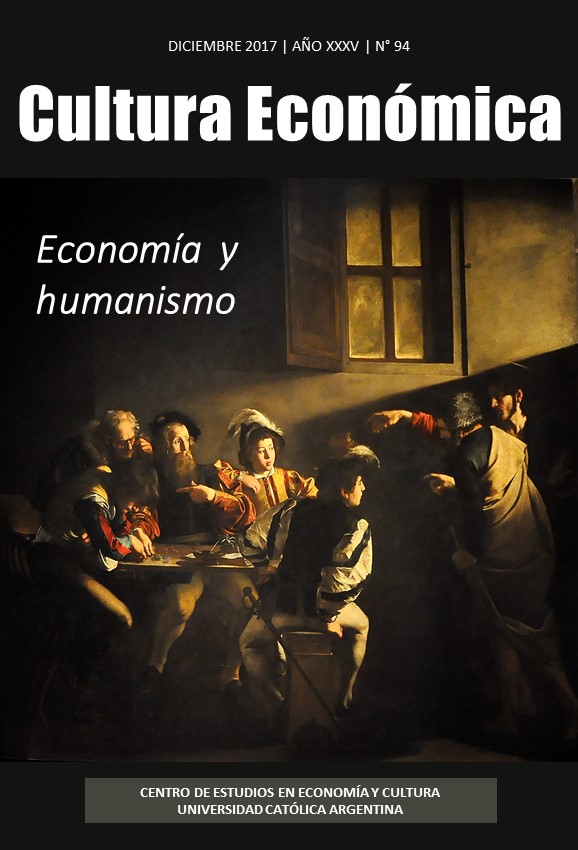What do epistemology and methodology contribute to the economy?
Keywords:
METHODOLOGY, RATIONALITY, ECONOMY, EPISTEMOLOGYAbstract
This article aims to highlight Epistemology and Methodology’s contributions to the economy and the formation of economists. This includes, on the one hand, the need to consider a broader rationality beyond instrumental rationality for the analysis of economic phenomena, and on the other hand, the consequences of this reductionism for the positive economy.Downloads
References
Buchanan, J.M. (1987). Economics. Between Predictive Science and Moral Philosophy. Texas A&M University Press, Texas.
Davis, J. (2003). The Theory of Individual in Economics. Routledge, Londres.
Davis, J. (2004). “Collective intentionality, complex economic behavior, and valuation”, en Davis, John B., Alain Marciano and Jochen Runde (eds.), The Elgar Companion to Economics and Philosophy. Elgar, Cheltenham y Northampton.
Davis, J. (2011). Individuals and Identity in Economics. Cambridge University Press, Cambridge.
Hayek, F. A. v. (1948). “Economics and Knowledge”, en Individualism and Economic Order. The University of Chicago Press, Chicago.
Heckman, J.J. (2001). Econometrics and empirical economics”, Journal of Econometrics 100, 3-5.
Hintikka, J. (1992). “The Concept of Induction”, en John Earman (ed.), Inference, Explanation, and Other Frustrations. Essays in the Philosophy of Science. University of California Press, Berkeley, Los Angeles, Oxford.
Hirschman, A. (1990). “Against Parsimony. Three Easy Ways of Complicating some Catgories of Economic Discourse”, Economics and Philosophy, 1, 7-21.
Knight, F.H. (1956). On the History and Method of Economics. University of Chicago Press, Chicago.
Leontief, W. (1971). “Theoretical Assumptions and Nonobserved Facts”, The American Economic Review, 61/1, 1-7.
McMullin, E. (1995). “Underdetermination”, The Journal of Medicine and Philosophy 20, 233-52.
Morgenstern, O. (1972). “Thirteen Critical Points in Contemporary Economic Theory: An Interpretation”. Journal of Economic Literature, 10/4, 1163-1189.
Nubiola, J. (2001). “La abducción o lógica de la sorpresa”, en Razón y palabra N°21. http://www.razonypalabra.org.mx/anteriores/n21/21_
jnubiola.html Último acceso: junio 2017.
Raz, J. (2005). ‘The Myth of Instrumental Rationality’, Journal of Ethics & Social Philosophy 1/1, 2-28.
Rescher, N. (1999). “Razón y realidad: La infradeterminación de las teorías y los datos”, en id. Razón y valores en la Era científico-tecnológica. Paidós, Barcelona.
Schenone, O. y S. Gregg (2003). Una Teoría de la Corrupción. Acton Institute, Grand Rapids.
Sen, A. (1987). On Ethics and Economics. Basil Blackwell, Oxford y New York.
Sen, A. (2002). Rationality and Freedom. The Belknap Press of Harvard University Press, Cambridge (Mass.) y Londres.
Shove, G.F. (1942). “The Place of Marshall’s Principles in the Development of Economic Theory”. The Economic Journal, 52/208, 294-329.
Smith, A. ([1776] 1952). La riqueza de las Naciones. FCE, Méjico.
Stewart, H. (1995). “A Critique of Instrumental Reason in Economics”. Economics and Philosophy 11, 57-83.
Wiggins, D. (2002). Needs, Values, Truth. Third Edition. Amended. Oxford University Press, Oxford-Nueva York.
Downloads
Published
How to Cite
Issue
Section
License












